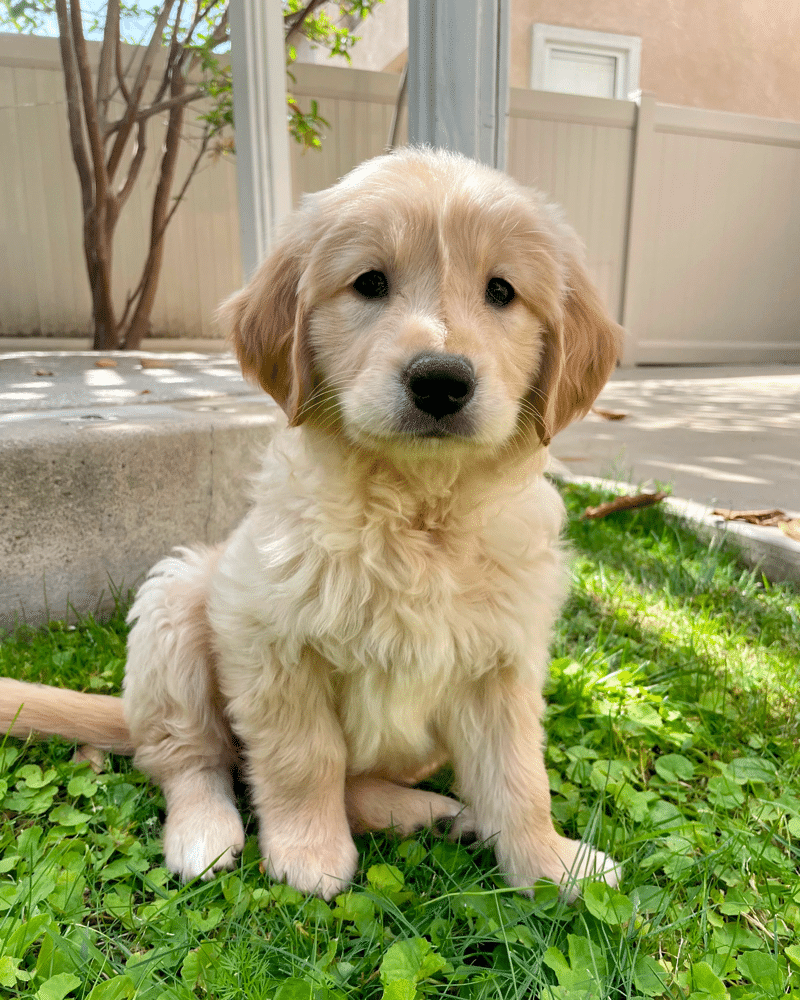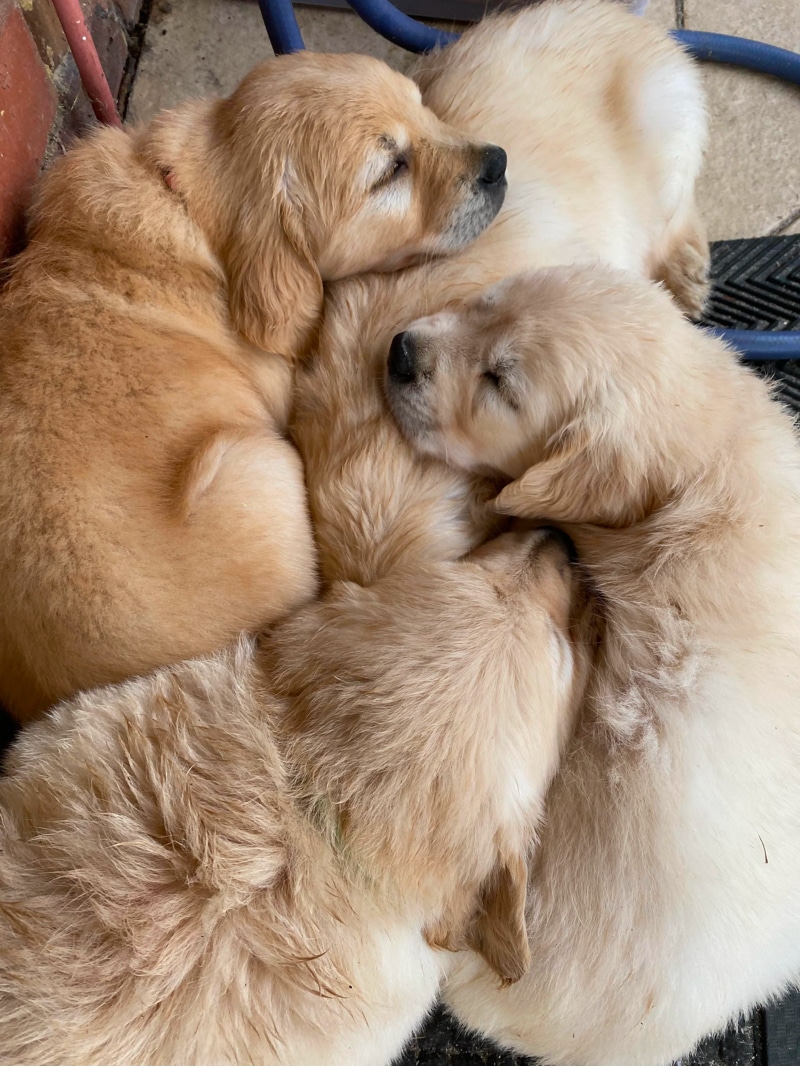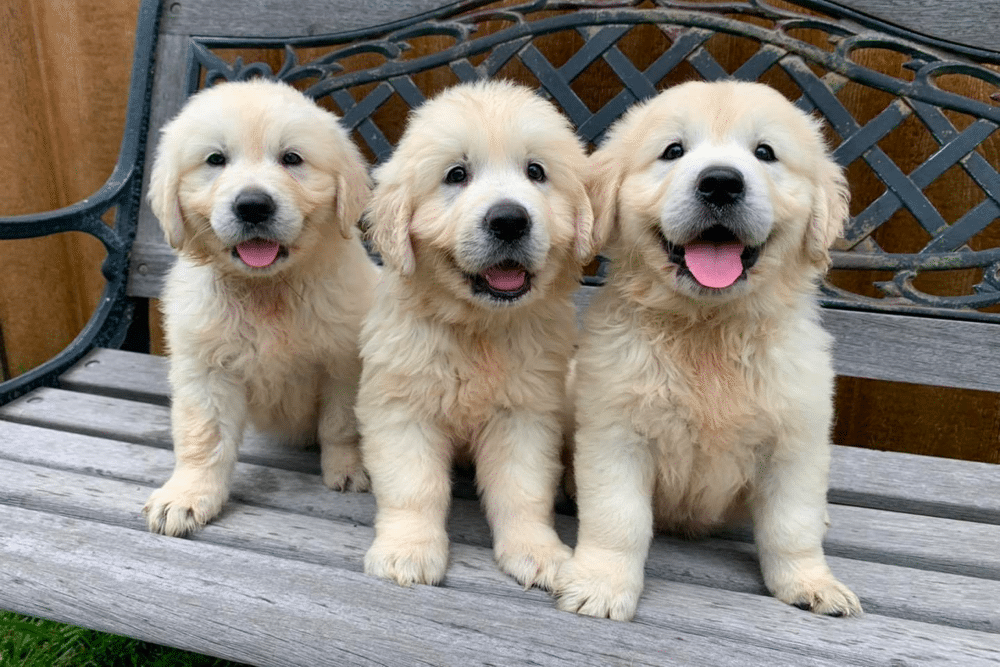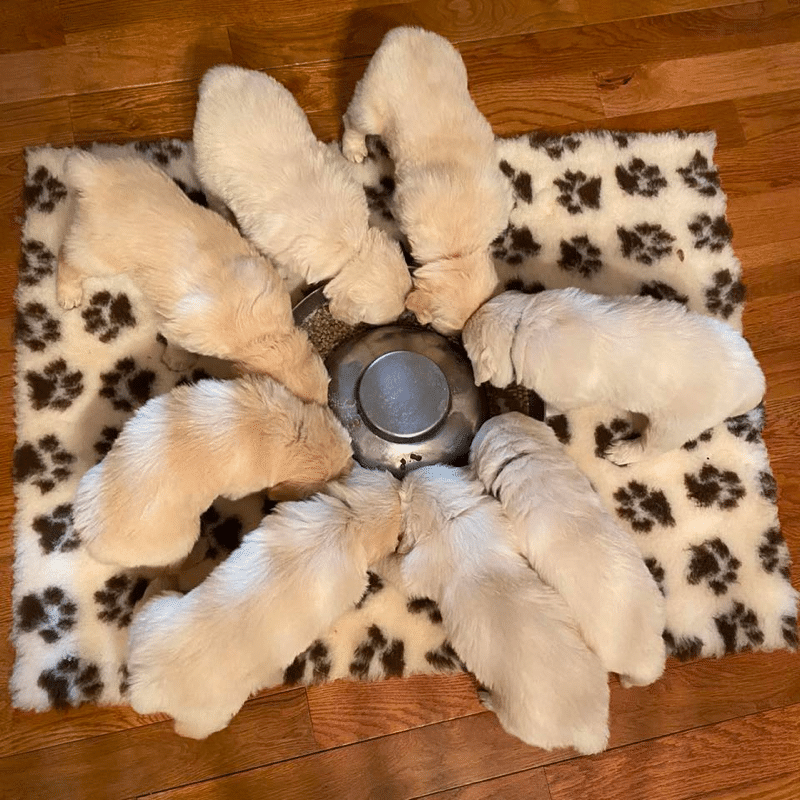Contents
A six-week-old golden retriever puppy is a wonder to behold. They’re adorable little balls of energy and fur.
By this time they’re up moving around and have a lot more of the typical characteristics that people associate with puppies (like getting into trouble!)
Golden Retrievers are so cute around this age, and of course, people will impatiently want to take one home at only 6 weeks old. But it’s really important that responsible pet owners wait until the puppy is 8-weeks old before taking a puppy home with them. The extra time is quite necessary because it gives them enough time with their mother and siblings, and allows for additional development.
In this article you’ll learn:
- Everything you can expect from your 6-week old golden puppy
- The importance of waiting until 8 weeks to take your pup home
- The negative effects of taking a puppy home too early
- And much more!
Why You Should Wait Until the Puppy is 8 Weeks

Of course, all you can think about is getting this adorable puppy home to snuggle and make friends with. But you have to resist that urge. Don’t ever bring home a six-week-old golden retriever puppy.
Waiting for the extra two weeks allows the puppy to have enough time with its family to foster healthy development.
If you’re offered a 6-week-old golden retriever puppy from a breeder, you should turn that offer down immediately, but politely. It’s probably a good idea to find a different breeder, as well. An ethical breeder would never rehome a puppy too early, and if they’ll cut corners in that area, who knows what other areas they’re neglecting?
It’s better to find a breeder who better understands how puppies develop and why they shouldn’t be rehomed early.
You may think that two weeks won’t harm the puppy and that it can’t be that big of a deal, but you would be wrong. I’ll explain why in the next section.
What Happens if a Puppy is Taken Home at Six Weeks?

Taking a puppy home prematurely can result in a number of behavioral issues as they grow and learn, which is not ideal. Golden retrievers are typically very easy to train, which is a trait that many pet parents look forward to, and you don’t want to negate that because you’re impatient.
Another important reason to not remove golden retriever puppies too soon is that it affects their health. Pups who are prematurely rehomed often have weakened immune systems and a lack of appetite.
Social Development
Golden retriever puppies still have a lot to learn from their parents and siblings when they’re 6 weeks old.
Being with their litter allows them to develop confidence and learn about how they should act with each new thing they encounter in their world.
This means that you’ll have a more emotionally stable puppy that’s easier to train and live with in the future.
Puppies need to play. It’s part of their growth and development, and playing with their siblings actually helps make them a more emotionally-stable puppy. It helps them to learn to get used to touching and being picked up or moved around.
You don’t want a puppy to become touch-sensitive and hate being picked up or dodging petting attempts.
The puppy’s mother instills in them a sense of confidence and security that no human can. She’ll also give puppies correction if they exhibit behavioral issues, and no one can compare to the discipline that comes from mothers.
Some of the problems that are common in puppies that are taken home at only 6 weeks old include:
- Aggression
- Fearfulness
- Lack of sociability with other dogs
- Possessiveness
- Separation anxiety
- Trouble sleeping
Leaving puppies with their mother and littermates for 8 weeks means that they’ll develop the ability to adapt to their new environment and learn how to develop good social relationships.
Bite Inhibition
One of the things that golden retriever puppies learn from their moms is proper bite inhibition. It’s quite normal for puppies to bite. However, their teeth are really sharp.
When they bite their mom or their siblings and they react to the bite, the puppy learns that biting hurts. Then they’ll learn how to not bite too hard.
The mom might either walk away from the pup or growl at them and put the fear of God in them.
A littermate will usually let out a startling yelp, which is enough to put a stop to whatever sort of play had been previously happening and let the puppy know that they bit too hard.
Humans can’t really teach puppies about biting in quite the same way. Sure, we might yell, but it’s not the same as learning from their littermates or their mom.
Golden retrievers are naturally mouthy, so they’ll still put things in their mouths and you’ll probably still wind up with your hand in the puppy’s mouth at some point. But if your puppy has been around its family for 8 weeks, it’s a lot less likely that they’ll bite you too hard.
It’s important to note that although your puppy probably won’t die if you bring it home too early, it’s better for your puppy and for you to wait so that they have the chance to learn and develop, and you won’t have to deal with development and behavioral issues.
What if I have a Six-Week- Old Golden Retriever Puppy?

First of all, don’t be too hard on yourself. These things just happen sometimes. Occasionally, a breeder will rehome a puppy too early, or you’ll be gifted a puppy too early. No matter how you came across your puppy, here’s what you should do.
Return the Puppy to Its Mother
Maybe you didn’t know about all of the negative behavior and developmental effects that removing a puppy too soon can cause. But, now you do and you’re worried about your puppy.
The best thing you can do is to call up the breeder and return the puppy to its mother for the next two weeks.
It will make enough of a difference that it’s worth the trouble, trust me.
If the breeder seems hesitant about this, first off, that’s a sign that they’re not a reputable breeder with ethical practices. Second, you can offer to pay for the puppy’s expenses until it’s old enough to rehome properly.
It may seem like an extra expense, but you would have paid to buy the puppy food and such, anyway. And it really is worth it just to make sure the puppy develops properly.
When the puppy is 8 weeks old, you can go pick up your pup from the breeder and take it home.
Find a Surrogate Canine Family
If you can’t return the puppy to its mother, then the next option is to make sure that your puppy spends the next couple of weeks around other puppies and dogs.
This is even more important if you don’t own other dogs that your puppy can learn from.
It’s crucial for puppies to grow and learn from other dogs at this young age. Of course, the ideal learning environment is with the puppy’s mother and littermates, but other puppies and dogs can teach your pup, as well.
Maybe you know someone who also has a puppy, someone who has an older dog that’s good with children and puppies, or someone who fosters dogs and puppies.
Ask your friends and family about finding a surrogate canine family for your puppy. Most responsible dog owners will understand the situation and be willing to help if they can.
If your friends and family can’t help, you can use social media to help find the ideal canine surrogate family for your puppy.
Talk to Your Veterinarian
If you’ve got a six-week-old puppy, no matter the circumstances that led you to obtain this young pup, you need to talk to your veterinarian immediately to learn more about how to ensure that your puppy is healthy.
Your vet can give you important information, like what to feed your puppy and when to feed them.
Of course, you may be advised about other ways you can keep your puppy healthy and avoid behavioral issues.
What to Expect With a Six-Week-Old Golden Retriever
Whether you’ve wound up with a six-week-old golden puppy already or you just want to know more about what they’re like at this age for educational or informational purposes, you should know that they’re a LOT of work!
Here are some things that are typical for 6-week old golden retriever puppies:
Sleep
If you spent the day with a litter of six-week-old Golden Retriever puppies, you’d probably be surprised to discover just how much they actually sleep.
Puppies grow a lot during this time (both mentally and physically), so they need loads of sleep to ensure they properly develop.
You’ll often notice a pile of puppies sleeping together, and other siblings playing as if they take shifts sleeping.
No matter how much energy your pups seem to have, they’ll eventually run out and need to take a nap.
Pottying
Just as with sleep, puppies poop and pee a surprising amount.
When they wake up, you should take them outside because they’ll need to potty. They’ll need to go out many more times throughout the day, as well. You can also expect to let them out after they’ve eaten, and after they’ve had playtime.
Good breeders begin potty training six-week-old golden retriever puppies so that they’ll be mostly potty-trained by the time their new owners take them home at eight weeks old.
Play
You can expect that your six-week-old golden puppy will be playing when it’s not sleeping or pottying.
Some of the games that six-week-old puppies play are chase, wrestling, and tug, as well as running around, and something similar to tag.
They’re also really good at playing fetch because of their Retriever instincts.
When playing with your six-week-old puppy, watch out for their super-sharp teeth. You’re pretty likely to catch some teeth a few times, but if you’re aware of it, you can avoid it happening often.
Teeth
Six-week-old golden retriever puppies are very mouthy. They use their mouths to explore their world, so just about everything winds up in their mouths at some point.
You can expect your six-week-old golden to have developed a full set of razor-sharp puppy teeth.
If your puppy doesn’t have a full set of teeth, it won’t be long until they’ll grow.
Eating
Puppies need their teeth because, by six weeks old, puppies are typically fully weaned. This means that they’ve started eating entirely solid foods.
Every now and then, you’ll find a six-week-old golden retriever puppy that still nurses. This is typically just habit and bonding because the puppy no longer needs the milk at this point. By six weeks the puppies need to eat so much that milk alone won’t fill their nutritional needs.
Most breeders start feeding six-week-old puppies several times throughout the day. You can expect your golden puppy to average between 4 and 6 meals every day.
Personality
A six-week-old golden retriever puppy starts displaying its personality. This is quite important when it comes to choosing which puppies are suited to be service dogs, and which ones would be better suited as house pets.
Breeders typically start running pre-tests with puppies this age to see which of the puppies are cut out to be service dogs.
Some of the things that breeders look for in service dogs at this age are:
- Confidence
- A willingness to work with their partner
- Calm temperament
Socialization
You’ll notice that your six-week-old golden retriever puppy will start using its nose more. This is because by six weeks, their sense of smell gets stronger and they’re learning how to use it.
Most breeders recognize this as the ideal time to start socializing puppies.
To socialize puppies, they’re introduced to new sounds, objects, and experiences so that they’re more confident and less fearful. This makes puppies more adaptable.
Socialization is an important part of puppy development because it can prevent behavioral issues from developing as the puppy grows. It can also help your puppy be the best version of itself.
If you’re visiting a six-week-old litter of puppies, then ideally they would be surrounded by a variety of objects so that the puppies can play with different types of toys. They should be in a big environment, as well, so that puppies can be moved from one area to the next to ensure that they’re experiencing different environments and toys without getting too comfortable with one place or toy.
If your puppy starts showing a little fear or trepidation when it encounters new places or things, you need to remember that this is perfectly normal. Sometimes humans are afraid of new things, too, right? So if your puppy displays signs that it’s a little afraid, give them encouragement and let them know they should be brave.
Six-week-old Golden Retrievers should be experiencing positive interactions with humans. This means that you should be inviting other people around your puppies to get them used to people.
If your puppy hasn’t been fully vaccinated, then it shouldn’t be allowed around other animals (not just other dogs!).
However, if your puppy has been fully vaccinated, then it should be allowed outside and should be gradually introduced to other animals. This will get them used to new experiences and let them learn to adapt when they’re introduced to animals they’ve never met before. So, if your puppy goes to a home with a cat and it’s never experienced a cat, it should have the emotional skills necessary to navigate that situation.
Six weeks is a good time to start training puppies, as well. Some of the things that you can start training your puppy on include acclimation to crates, and learning to sit while they’re eating.
Basically, your six-week-old Golden Retriever puppy will eat, potty, sleep, and play a LOT. And their intelligent little brains will be eager to learn anything you teach them, so you should definitely start teaching them as much as you can before you send them to live with their new family in a couple of weeks.
Growth
Up until this point, your puppy has likely experienced a lot of growth. But how much does a six-week-old Golden Retriever puppy grow?
From the sixth week on, you can expect your puppy to gain 5 ounces per week. They’ll eventually wind up weighing around 21 lbs when they’re fully grown.
What to Feed Your Six-Week-Old Golden Retriever Puppy

Of course, you’ve probably got some inkling that you should feed your six-week-old puppy something that’s labeled “puppy food”. But which type of food should you feed your puppy?
The AKC specifies that puppies that are between 6-12 weeks old should be fed puppy food that’s formulated to meet that breed’s nutritional needs.
Because Golden Retrievers can get so large, it’s a good idea to get large breed puppy food, such as Purina Pro Plan for large breed dogs. The reason you should choose a large breed puppy food is that it’s designed to give your puppy specific nutrients to foster slow growth over time.
Another thing you should look for when you’re shopping for puppy food is a brand that includes DHA. DHA is a type of fatty acid that’s important for brain development, so it’s important for intelligent, easy-to-train dogs like golden retrievers.
When you start feeding your puppy solid dry kibble, you need to moisten it to soften it a bit. You can do this with either water or broth. Personally, I put the water or broth in with the kibble for about 5-10 minutes, or long enough for it to soak up the liquid. I’ve heard of people microwaving it so that it’s a bit warm, as well, because puppies aren’t used to consuming anything that’s cold yet.
You’ll need to soften your puppy’s food for around a month.
Give your puppy small meals around 4- 6 times a day so that it gets all of the nutrients and energy it needs.
Even if you know it won’t immediately harm your puppy, don’t feed them adult dog food. Adult dog food doesn’t include the nutrients that puppies need for healthy development.
Vaccinations
Your six-week-old golden puppy will be eager to explore the world at this age, but they’re also really prone to a number of diseases, such as distemper and parvo. This is why it’s so important to get them vaccinated on time.
Most veterinarians will start vaccinating pups when they’re 6-8 weeks old.
Puppies will need shots every 3 weeks until they’re around 4 months old.
You should stay current with your pup’s vaccination schedule to ensure that your puppy stays healthy.
In some places, certain vaccinations are required, like rabies vaccinations.
Patience with Your Puppy
Patience is key when it comes to bringing home a new puppy.
Even if you want to immediately bring home a six-week-old ball of adorable fluff, you need to resist that urge so that the puppy can receive all the experiences it needs to develop properly. This will give you fewer chances that the puppy will develop behavioral disorders later down the road.
You should look for a breeder that wouldn’t part with a puppy before it reached eight weeks old because they understand how important the last two weeks are to puppy development.
It may be difficult to wait, but you’ll be glad you did in the long run because it will mean that your puppy grows into an emotionally stable, healthy, and happy dog. You won’t have a difficult time training your dog or adjusting to life with your new family member.
Check out our other posts about the development of Golden Retriever puppies:
- Raising Your Golden Retriever Puppy to Adulthood: Height and Weight Growth Chart
- 8-week-old Golden Retriever Puppies
- 3-month-old Golden Retriever Puppies
- 4-month-old Golden Retriever Puppies
- 5-month-old Golden Retriever Puppies
- 6-month-old Golden Retriever Puppies
- 7-month-old Golden Retriever Puppies
- 8-month-old Golden Retriever Puppies
- 1-year-old Golden Retriever Puppies
- 2-Year-Old Golden Retriever: Full-Grown, Adulthood, Playful
- Senior Golden Retriever: Signs of Aging and How to Care for Your Old Dog
